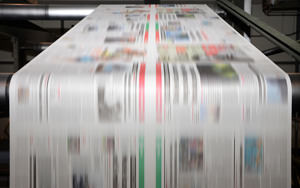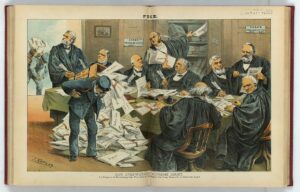Change Has Always Been the New Normal
I live and work in a world in which, as they say: "Change is the new normal." I'm sure you do, too.
I live and work in a world in which, as they say: “Change is the new normal.” I’m sure you do, too.
At the Annenberg School for Communication and Journalism of the University of Southern California, there are, more or less, two kinds of people talking forever about their differences. There are the old-school folks who came from newspapers and television. They are known as “content people.” Or “the old farts.” I am one of them, teaching writing, communication history and politics. Then there is the new crowd, sometimes called “distribution people.” Or “the kids.” They teach about technical, digital, multiplatforms, social media and a lot of other stuff the old folks don’t really understand or are clumsily trying to learn. We are as friendly as people can be when they speak different languages.The students, almost without exception, are fairly comfortable with both sides of the faculty, wanting to learn old and honored stuff like reporting, good writing and good journalism, and learn evermore about the new gadgets in their “toolboxes.”There is, of course, nothing new about this, except for the blurring speed of the new media. I am reminded of what life was like on the Lower East Side of Manhattan in the early days of the 20th century. The kids in families coming from Eastern Europe were greatly empowered because they quickly learned English while their parents and grandparents knew only the foreign languages of the old countries.I should be something of a double threat because I graduated from college with a degree in mechanical engineering and understand some of the new words rather than the new worlds. But in fact, the engineering I learned — slide-rules, drafting or mechanical drawing, even welding and glass-blowing — is mainly seen in museums now. I used to joke that a couple of years after I left Stevens Institute of Technology in the 1960s, Texas Instruments was selling everything I knew for about $19. Calculators that opened the doorway to the future did in me and my colleagues. We knew how to solve problems — “isolating the variable” was our real tool. It still is at the heart of problem-solving, but unfortunately, many of us were working on the wrong problems, like saving newspapers. With that background, I was fascinated by the Technology Issue of The Atlantic magazine, out this week. One headline was “The 50 Greatest Breakthroughs Since the Wheel.”© 2013 UNIVERSAL UCLICK
Your support matters…Independent journalism is under threat and overshadowed by heavily funded mainstream media.
You can help level the playing field. Become a member.
Your tax-deductible contribution keeps us digging beneath the headlines to give you thought-provoking, investigative reporting and analysis that unearths what's really happening- without compromise.
Give today to support our courageous, independent journalists.






You need to be a supporter to comment.
There are currently no responses to this article.
Be the first to respond.